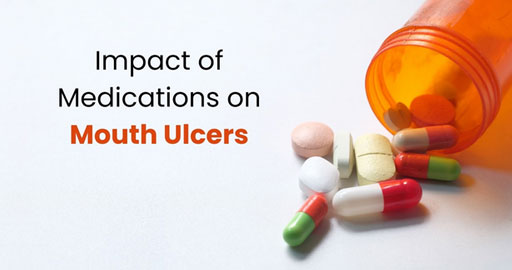
What is the Impact of Medications on Mouth Ulcers
Mouth ulcers are painful lesions that are formed on the mucous membranes in the mouth, acting as a lubricating lining that causes so much pain while either eating or speaking. While sometimes these ulcers can result from certain medications, they may result from such factors as stress, trauma, and some foods. It is very important that people understand the effect of these sores on mouth ulcers.
Medications can also blunt, induce, or enhance a pre-existing ulcer through their effects on the immune system, oral tissues, or as a side effect of the drug per se. The ways medications can affect the incidence of mouth ulcers are as follows:
1. Immune-modulating effects:
Immunocompromised agents: Immunocompromised agents include certain chemotherapy medication, biologic used for autoimmune diseases, or corticosteroids. They reduce the ability of the body to fight against infections. Low immunity predisposes these patients to oral ulcers.
2. Direct Tissue Irritation:
- Some Antibiotics: Some antibiotics, like tetracycline and penicillin, irritate the mucous membranes directly and often cause ulcerations of the mouth.
- Nonsteroidal Anti-Inflammatory Drugs NSAIDs: Taken mostly as painkillers, the drugs often irritate the stomach lining, causing, albeit in very rare cases, mouth ulcers.
3. Allergic Reactions:
Allergic Reactions to Drugs: The results of allergic reactions to drugs may appear in the form of mouth ulcers among other kinds of disorders. These can be because of allergic reactions to a wide range of drugs, including antibiotics and anticonvulsants.
4. Nutritional Deficiencies:
Classes of Medications Affecting Absorption of Nutrients: Some classes of medication are likely to prevent the body from absorbing some of the key nutrients that are vital in the body. They are vitamin B12 and B6 deficiencies and iron. The insufficiency of the above vitamins and iron leads to a prevalence in mouth ulcers.
Prevention of Mouth Ulcer Due to Medications:
Take the case up with him if you feel it is due to your medicines, and do not discontinue their use without talking about the exact same to him. He might have the following measures to adopt.
- Changing the medication: He might want to reduce the dose or prescribe another medication, which shall not cause mouth ulcers.
- Oral Hygiene: The teeth and general mouth hygiene should be taken care of with regular brushing. This should be with a soft-bristle toothbrush, avoiding any harsh-abrasive toothpaste to prevent increased irritation toward the inside of the mouth.
- Topical Treatments: Over the counter kind of topical treatments, available in the forms of either a mouthwash or gels that act with an anesthetic or anti-inflammatory agent, will help to soothe and quicken the healing process.
- Nutritional Supplements Depending on the extent to which the drugs interfere with nutrient absorption, your doctor may prescribe supplements to make up for the losses.
Try to always remember never to stop or change any medications without your health expert. There are the drugs that they will put you on to handle the mouth ulcers, so that you manage the ulcers effectively, yet ensure your overall health is uncompromised.
Knowledge of such ulcerations and how they are affected by medications is crucially important in order to allow patients to take proactive action, in conjunction with their care provider, towards minimizing discomfort and making sure that the management of the oral lesions is effective.
Leave a Reply
Leave a Reply
Explore More Similar Posts
Explore More Blogs


Leave a Reply